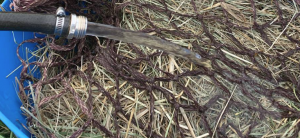 Soaking horse hay safely should be as easy as washing your hair, right? Lather, rinse, repeat. But, alas, no.
Soaking horse hay safely should be as easy as washing your hair, right? Lather, rinse, repeat. But, alas, no.
Like many horse-keeping chores, soaking hay requires equal measures of finesse and know-how. Done improperly, soaking can result in complete nutrient washout. This leaves horses at risk for excessive weight loss and nutrient deficiencies, including insufficient crude protein and amino acids.
“Previous studies show that soaking hay removes water-soluble carbohydrates (WSC), which is desirable for horses with metabolic syndrome or overweight horses on calorie-restricted diets,” said Kathleen Crandell, Ph.D., a nutritionist for Kentucky Equine Research.
In addition to WSC, other nutrients, such as these essential minerals: phosphorus, potassium, magnesium, manganese, zinc, copper, and iron, are leached from the hay when it is soaked.
Observations:
One recent study found that, in addition to trace minerals, crude protein and amino acid levels also diminish rapidly after just 15 minutes of soaking.* The researchers soaked hay for variable periods of time, ranging from 15 minutes to 12 hours, followed by a 20-minute draining period. Important observations included:
- As expected, soaking hay decreased WSC and other important nutrients, such as water-soluble minerals;
- Metabolizable energy decreased by 5-15%. This indicates the forage will not provide as much energy as expected, potentially resulting in weight loss;
- Crude protein and amino acids decreased by up to 17% and 35%, respectively; and
- Nutrient and energy losses were appreciable after 15 minutes of soaking. Longer soaking durations did not enhance the washout effect.
“To compensate for energy losses, owners should offer up to 15% more calories in the ration, as long as weight loss is not one of the desired effects. Additional forage would not, however, compensate for the 35% amino acid loss. If a horse owner was to add 35% more forage to account for amino acid losses, then the horse’s ration would be too rich in energy. Therefore contributing to weight gain, if the horse could even eat that much” explained Crandell.
Instead of compensating for amino acid losses by offering more soaked forage, Crandell recommends supplementing with a high-quality ration balancer that contains a full complement of amino acids. A ration balancer would also make up for any vitamin or mineral shortfalls caused by soaking.
Many horses benefit from hay soaking, including those with metabolic syndrome, chronic laminitis, and asthma. Soaking hay without an understanding of nutrient losses may result in caloric and nutrient deficiencies. According to this study, these losses occur quickly. After only 15 minutes of soaking, suggesting that soaking hay longer is unnecessary.
